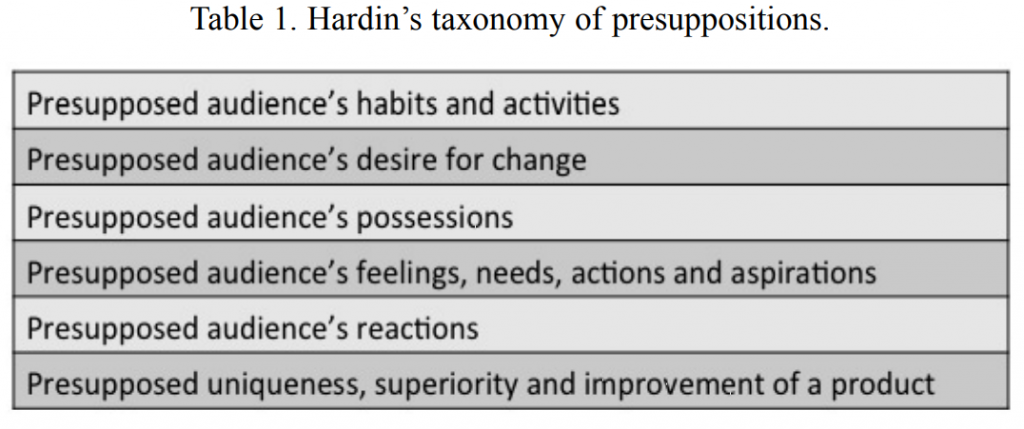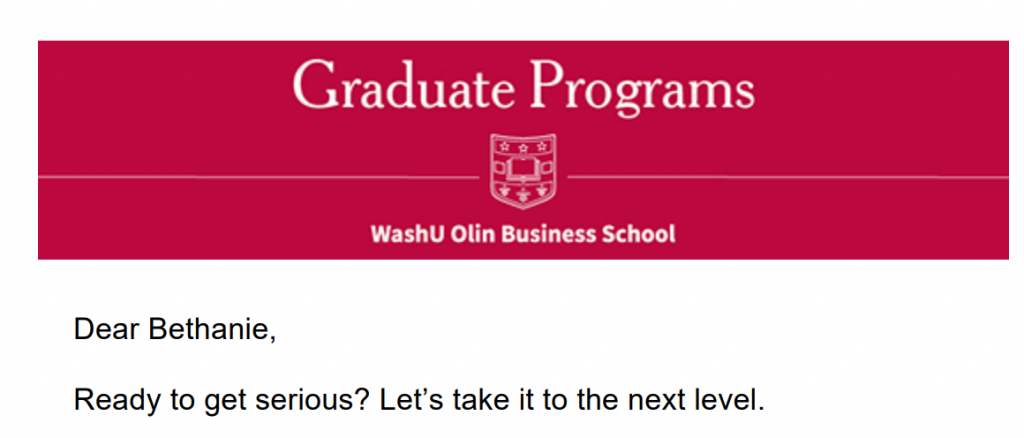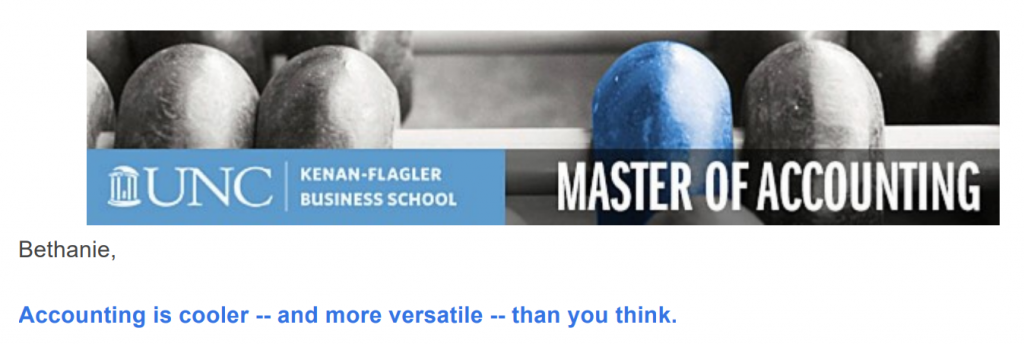Presupposition in College Recruitment Emails
By Beth Garcia
Introduction
At this point, most people understand at the heart of advertisement is persuasion. There will always be some kind of product or service that a company or person is persuading you to use. From a pragmatics standpoint, the use of Gricean Maxim violations as well as presupposition is an integral part of presenting an important, persuasive message in the most economical way. In her 2001 study regarding persuasion in Spanish advertising, Karol Hardin states that Grice’s Maxims are important to advertising because they allow “the advertiser or speaker in an ad to communicate more than what is actually said” (2001), which is also the case for presupposition.
To presuppose is “to assume, suppose or postulate beforehand; to take for granted; to think or believe (something) in advance of actual knowledge or experience” (OED). In a conversation between a speaker and a hearer, the two work together to figure out what is shared knowledge and what is necessary information needed in an utterance. Presupposition is the shared knowledge between the two participants. It is also the information we understand in addition to what is actual said.
Use of these linguistic tools allows advertisers to draw in readers with the illusion of a conversation. They can presuppose certain ideas to cater their advertisement to particular groups of people in a short amount of ad space. In her study, Hardin categorized these different areas of presuppositions into six classes which you can see below.
Tamara Bouso examined presupposition in magazine health advertisements in her study “Presupposition, Persuasion and MAG Food Advertising: a Preliminary Study”. She collected her health food advertisements and compared them against Hardin’s six category taxonomy of presuppositions.

In a similar fashion, university email advertisements also contain a fair amount of presupposition. This project will collect and compare presuppositions from business and management schools’ recruitment emails and compare them to Hardin’s Taxonomy, discuss their adherence or divergence from the taxonomy, and prevalence of presupposition in the corpus data. If the presupposition examples follow other advertising studies and can be classified under these six categories, which category is the most common technique used.
Methodology and Materials
After signing up for the Graduate Management Assessment Test (GMAT), typically required for admission into business management schools in the United States, I received many emails from schools around the country, as well as some international schools. I collected 97 of those emails from 18 universities beginning late February 2021 until mid April 2021. I did not endeavor to collect an equal amount of emails from each school as they came in varying quantities and frequencies. The original list of emails is broken down by school below.
| UNIVERSITY/BUSINESS SCHOOL | # of EMAILS |
| Washington University Olin Business School | 11 |
| HKU Business School | 4 |
| Hult International Business School | 20 |
| Oakland University | 7 |
| University of Pittsburgh Katz Business School | 7 |
| Case Western Reserve University Weatherhead Schol of Management | 3 |
| Brandeis International Business School | 1 |
| IE University | 4 |
| Vanderbilt University | 7 |
| University of Illinois Gies College of Business | 4 |
| Northwestern University Kellogg School of Management | 4 |
| University of Minnesota Carlson School of Management | 7 |
| Duke’s Fuqua School of Business | 6 |
| Michigan Ross | 5 |
| Pepperdine Graziadio | 1 |
| USC Marshall | 1 |
| Carnegie Mellon University Tepper School of Business | 2 |
| UNC Kenan-Flagler Business School | 3 |
| TOTAL | 97 |
I examined each email for examples of presupposition, focusing on the subject line of the email and the main graphic or message highlighted in the body of the email. I discarded those that did not contain presupposition. The final collection of emails containing presupposition, shown in the table below, were compared to the six categories of Hardin’s presupposition taxonomy provided above.
Of the original 97 emails, I found 39 total examples of presupposition. Some emails contained no examples, some only one, and a very few contained two examples.
| UNIVERSITY/BUSINESS SCHOOL | Number of Examples of Presupposition |
| Brandeis International Business School | 1 |
| University of Minnesota Carlson School of Business | 8 |
| Duke’s Fuqua School of Business | 2 |
| University of Illinois Gies College of Business | 1 |
| HKU Business School | 3 |
| Hult International Business School | 5 |
| Northwestern University Kellogg School of Management | 3 |
| Oakland University | 3 |
| Washington University Olin Business School | 2 |
| Michigan Ross | 5 |
| Carnegie Mellon University Tepper School of Business | 1 |
| UNC Marshall | 1 |
| Vanderbilt University | 4 |
| TOTAL | 39 |
After collecting the 39 example sentences containing presupposition, I matched them against the example categories in the Hardin Taxonomy. Results are discussed below.
Results and Discussion
I found that the examples of presupposition in university recruitment emails did fall under the same categories outlined by Hardin in her 2001 study and more recently used by Bouso. There were no presuppositions I felt fell outside those categories, though I do propose a subcategory of number four below that is unique to university advertisements.
Of the 97 emails that originally made up my corpus of data, 39 examples of presupposition were found. That is roughly 40% of the emails containing presupposition. The most common information taken for granted by these emails was that I as the recipient of these emails was already interested in these business schools or improving my chances in the business job market.
- Presupposes Audience’s Habits and Activities
In this category, the advertisement presupposes that the reader has certain habits or has not been initiated yet into certain activities.

In this example from Brandeis International Business School, the subject line “Your April Update” presupposes:
- There is a monthly update for this school.
- That I have expressed previous interest and require updating.
- That there are updates for other months of the year.
This suggests that I am in the habit of receiving monthly updates from this university. This category was rarely used as a presupposition tactic.
2. Presupposes Audience’s Desire for Change
This category assumes the reader would like to change something for the better.

In this example, Gies Business School says “Boost your value on the job market”, which presupposes:
- I am in the market for a job.
- Currently I have low value or none at all in that market.
- I am looking to change that level of value.
- I can increase my value with this university.
This is a commonly used presupposition tactic among the emails. It presupposed I was wanting to change my career, or begin a new journey much in the same way fitness advertisements presuppose people are unhappy with how they look and want to “Start their weight loss/fitness journey”.

In this next example from Olin Business School, the email reads: “Ready to get serious? Let’s take it to the next level.” These two sentences presuppose:
- I want to proceed to the next level.
- I am unhappy with my current level.
- I was not serious about getting to the next level before.
- Olin Business School can take me to the next level.
The overall message presupposes that I am not happy at my current level and have been looking to improve, but I was not ready to do so previously. If I want to take this change seriously, I need to apply to Olin Business School.
3. Presupposes Audience’s Possessions
I did not find any examples of presupposition of the reader’s possessions in these recruitment emails. This category presupposes that readers already own an item (or service) and then compare them to what is being advertised, establishing some implicit competition. However, typical university students do not switch universities once a program has begun so this tactic would not have a wide audience, if any.
4. Presupposes Audience’s Feelings, Needs, Aspirations, and Actions
These advertisements already understand what you need or aspire to and are here to provide the answer.

In the example above from Vanderbilt University, the title “Everyone is welcome here” presupposes:
- My need or aspiration to be accepted into a business school.
- A ‘there’ or other business school.
- Everyone is not welcome ‘there’/other business schools.
- If I want to be accepted, I need to apply to this school.
This advertisement presupposes I have a need/desire to attend a school where I feel welcome, but other schools do not have such a quality.

This next example from the same school reads, “Fast track your finance career.” This presupposes:
- I wish to obtain a degree in finance.
- I desire a career in finance.
- This degree offered is required for a career in finance.
- I desire/need to attain this career faster than typical programs.
Overall, the advertisement presupposes not only that I desire a career in finance, but that I have some kind of time restraint and must accomplish my goals quickly.
This is also a popular category of presuppositions used in the recruitment emails. I believe there is also a subcategory here that is not mentioned with Bouso and perhaps is unique to recruitment emails. Many emails not only played on the need or aspiration to be accepted into a business school, but also added a time limit to add a hurried/rushed feeling to the emails.
“There’s Still Time: Connect with Us Virtually”
“Deadline Approaching for Your Application”
“Your deadline is approaching”
“Action Required: Your Application is Due Tomorrow”
Not only did these emails presuppose that I had interest in these universities, but that I had already or planned to soon start an application and the deadline was quickly approaching. They also presupposed that I needed to ‘fast-track’ my degree or career path. Even when I was accepted, there was a time limit on how long the degree would take. I needed to rush to apply and rush through the program to start my career fast.
5. Presupposes Audience’s Reaction
This category takes for granted doubt or surprise from a reader, typically from an image.

This example from UNC’s Kenan-Flagler Business School begins with “Accounting is cooler — and more versatile — than you think” which presupposes:
- I have already considered accounting.
- I believe accounting to be boring and limited.
- This university can change my mind.
This advertisement takes for granted my doubt that a Master of Accounting can be cool and versatile.
6. Presupposes Uniqueness, Improvement and Superiority of a Product, Establishing in Most Cases an Implicit Competition
Advertisements in this category presuppose the improvement of a product or the superiority of the advertised product in relation to other similar items on the market.


These two examples from Michigan Ross presuppose:
- Recruiters want specific experience.
- Other products/universities offer subpar or fake experience.
- Recruiters do not want that other business experience.
- Recruiters will want the experience you get from this university.
Conclusion
Overall, I expected that the presuppositions found in recruitment emails would follow the categories laid out by Hardin’s Taxonomy of presuppositions in advertising. University recruitment emails are just advertisements for the university made to draw in prospective students. They are offering a product (an graduate level education in business) just like any other advertiser.
The only variance I found apart from Hardin and Bouso’s studies is the added element of time in some of the recruitment emails. Some universities seemed to want to rush students into applying to their school by creating arbitrary deadlines. I often received emails that would state “Application due tomorrow” and then some time later, another email for the same university and program stating “Deadline approaching” or “Deadline extended”. There was also wording in some emails to suggest the need to fast track degrees and career goals. Even after you rushed to apply, you had to rush through your education to achieve your goals faster. However I found this tactic mainly applied to the desire or need to accomplish goals quickly so I feel it is better classified as a subcategory of Hardin’s category four: presupposes audience’s feelings, needs, actions, and aspirations.
| CATEGORY | TOTAL PRESUPPOSITIONS FOUND |
| Presupposes Audience’s Habits and Activities | 2 |
| Presupposes Audience’s Desire for Change | 10 |
| Presupposes Audience’s Possessions | 0 |
| Presupposes Audience’s Feelings, Needs, Actions, and Aspirations | 15 |
| Presupposes Audience’s Reactions | 5 |
| Presupposes Uniqueness, Superiority, and Improvement of Product | 7 |
As for the variety of categories used by recruitment emails, I was surprised there was a fair amount in each category. I had originally predicted that most of the presuppositions would belong to category six, presupposing superiority of product. I assumed the universities would be comparing their programs to other universities, working under the assumption that the reader had already decided to look for business schools. I based this off the knowledge that I started receiving these emails after registering for the Graduate Management Assessment Test (GMAT), typically used over other graduate level tests specifically for business schools. However, there was a decent variety as seem above in figure 7.1.
However, the category with the most presuppositions was category four: presupposition of feelings, needs, actions, and aspirations. The advertisements really targeted people looking to make a career change or to take the next step in their choses career path. I suppose this should not have been that surprising as people signing up for the GMAT would already have a career in business in mind, otherwise they would more likely be taking the GRE (graduate record examination).
The second most common was category two: desire for change. I think this may be aimed more at working professionals that are discontent with their current working situation and looking for a change in careers. That seemed to be the overall theme in that set of emails.
Although these were the two most used presuppositions, there was still a variety of categories used. I did not see any one tactic used by one university more than others. It seemed that universities that sent multiple emails used multiple presupposition categories in order to appeal to the widest audience possible.
Bibliography
Bouso, T. (2017). Presupposition, persuasion and Mag Food advertising: A preliminary study. ODISEA. Revista De Estudios Ingleses, (13). doi:10.25115/odisea.v0i13.225
Brandeis International Business School. “Re: Your April Update.” Message to Bethanie Garcia. 21 April 2021. Email.
Hardin, K. 2001. Pragmatics in Persuasive Discourse of Spanish Television Advertising. Dallas, TX: SIL International; [Arlington, Tex.]: University of Texas at Arlington, Publications in Linguistics
Katrina at Gies Business. “Re: Boost your value on the job market.” Message to Bethanie Garcia. 3 April 2021. Email.
Michigan Ross. “Re: Get the real business experience recruiters want.” Message to Bethanie Garcia. 29 March 2021. Email.
“presuppose, v.” OED Online, Oxford University Press, March 2021, www.oed.com/viewdictionaryentry/Entry/11125. Accessed 25 April 2021.
UNC Masters of Accounting Program. “Re: Accounting is cooler – and more versatile – than you think.” Message to Bethanie Garcia. 2 March 2021. Email.
Vanderbilt Career Launcher. “Re: Everyone is welcome here.” Message to Bethanie Garcia. 21 March 2021. Email.
Vanderbilt MS Finance Program. “Re: Fastrack your finance career. In just 10 months.” Message to Bethanie Garcia. 4 March 2021. Email.
WashU Olin Business School Graduate Admissions. “Re: Are you ready for the next step?” Message to Bethanie Garcia. 19 March 2021. Email.